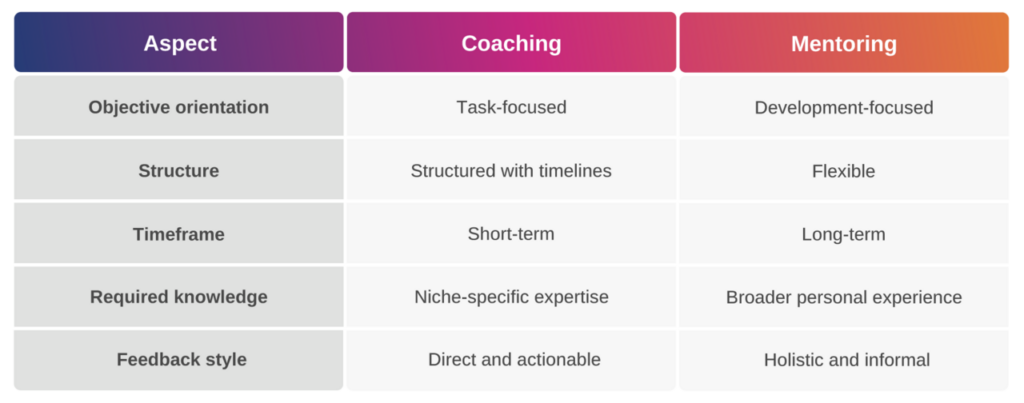Do you dream of finding a profession that results in real transformation and empowers people to live more fulfilling lives? Coaching and mentoring offer meaningful ways to foster your own personal or professional growth while helping other people grow, each one catering to different needs and aspirations.
The first step in pursuing this vocation is understanding the differences between a coach and a mentor. In this article, the coaching experts at Co-Active will guide you through the nuances and differences of coaching vs. mentoring and how to decide which path aligns with your goals or career aspirations.
Learn Coaching Basics with the Co-Active Fundamentals Course
Defining Mentoring and Coaching
Coaching is a structured process to help individuals achieve specific, measurable goals within a defined timeframe. A coach serves as a guide, asking thought-provoking questions and providing actionable feedback to empower clients.
Mentoring, however, is a more informal, long-term relationship where the mentor shares experiences, wisdom, and advice to support the mentee’s personal and professional growth. Mentoring often focuses on holistic development rather than achieving specific objectives.
Coaching vs Mentoring: The Key Differences
While both coaching and mentoring aim to support individuals and help them pursue meaningful change, they differ in approach, duration, and objectives. Let’s take a closer look :
Objective Orientation
- Coaching: Task-oriented, focusing on achieving specific goals. For example, a leadership coach might help an executive improve communication skills.
- Mentoring: Development-oriented, supporting the mentee’s career trajectory or personal growth. For instance, a mentor might guide a young professional in navigating a career transition.
Structure and Approach
- Coaching: Highly structured, with regular sessions, timelines, and progress tracking.
- Mentoring: Flexible, evolving organically based on the mentee’s needs.
Timeframe and Outcomes
- Coaching: Typically short-term, with predefined outcomes. A coach might work with a client for six months to prepare for a promotion.
- Mentoring: Long-term, focusing on ongoing development without immediate objectives.
Duration and Frequency of Interactions
- Coaching: Short, frequent, and consistent sessions.
- Mentoring: Less frequent, more open-ended interactions over an extended period.
Industry-Specific Knowledge Expectations
- Coaching: Requires expertise in a specific field or skill. For example, a sales coach should understand sales strategies.
- Mentoring: Focuses more on personal and career development, leveraging the mentor’s broader experiences.
Register for Coaching Fundamentals Now
Goal Setting and Tracking at a Glance

Choosing Coaching Vs. Mentoring: An Example
Imagine Alexis, a young entrepreneur stepping out of the corporate skincare industry to launch her new natural line of personal care products. She knows she needs help in this transition period. Alexis is curious about the difference between mentoring and coaching and which would benefit her most.
In this situation, Alexis is in a season of skills acquisition and implementation, high decisions, and real deadlines. With specific goals and an articulated timeline ahead, she would benefit from a coach trained in actionable goal-setting techniques who will meet her regularly as she charts her entrepreneurial path.
Which Career Is Right for You?
Choosing between coaching and mentoring as a career depends on your skills, preferences, and goals. Here are some things to consider:
Choose a Coaching Career If:
- You are goal-oriented and enjoy helping clients achieve specific outcomes within defined timeframes.
- You prefer structured interactions with formal relationships and defined responsibilities.
- You have specialized expertise in areas like health, leadership, or communication.
- You have overcome significant challenges and can guide others through the same.
- You have a coaching certification.
- You excel at providing direct, actionable feedback.
- You are motivated by short-term engagements.
- You value continuous learning and professional development.
Co-Active Coach Training has trained and launched over 150,000 effective coaches worldwide using our proven Co-Active Coaching Framework. Check out our courses and course bundles now and consider becoming a Co-Active Coach.
Choose a Mentoring Career If:
- You prefer more organic relationships and enjoy building trust over time.
- You want to share your transformative experiences to inspire and guide others.
- You want to focus on holistic development, supporting individuals in career navigation and personal growth.
- You prefer long-term engagements without a rigid structure.
- You provide feedback informally and prefer organic growth in relationships.
- You value evolving leadership that grows naturally with flexible goals.
Skill Requirements for Coaching
Successful coaches wear numerous hats and learn to focus on multiple levels simultaneously. To succeed as a coach, you will need to develop these skills:
- Industry-specific technical skills with hands-on expertise in your coaching niche.
- Insightful questioning to encourage clients to explore ideas deeply.
- Goal orientation that sets and tracks measurable objectives.
- Knowledge of accountability frameworks to help clients stay on track with proven tools.
- Inspiring and motivational skills for empowering clients to celebrate goal achievements.
- Engaged and active listening to instill value and prioritize personal engagement.
- Business development knowledge to market and grow your practice effectively.
- Credible coach certification for establishing your expertise and credibility.
Register for Coaching Fundamentals Now
Skill Requirements for Mentoring
Successful mentors evolve as they invest in others. To be effective in this role, you must learn to demonstrate the following skills:
- Relationship building to grow trust and mutual respect through vulnerability and integrity.
- Guiding mentees in leadership development which encourages growth in critical areas.
- Keen observational skills to identify strengths and opportunities for improvement.
- Creativity in problem-solving for finding innovative solutions.
- Career direction guidance to help mentees navigate career decisions.
- Individual growth knowledge to creatively support mentees in skills development.
- Mentoring certification will enhance your ability to mentor effectively.
Start Your Co-Active Coaching Journey Today
Comparing coaching vs. mentoring demonstrates that both are transformative and value-packed pathways, each with unique strengths. When considering a career option that offers transformative results to others, understanding the difference between mentoring and coaching will guide you toward the best fit for you.
Whether you choose coaching or mentoring, the Co-Active Training Institute can equip you with a foundational, ever-evolving practice that activates leadership skills in and through you as you learn to live in the paradox of being and doing. By pursuing a career in coaching or mentoring, you become a catalyst for engaged, effective, and energized cultures — helping others begin to live with significance.
Discover how Co-Active Training Institute can support your journey toward a meaningful career.

